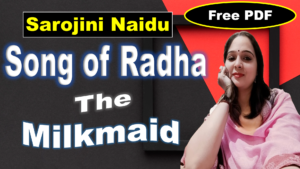Spring and Fall by Gerard Manley Hopkins | Spring and Fall Poem | Explanation | Summary | Key Points | Gerard Manley Hopkins | Word Meaning | Questions Answers | Critical Appreciation | Themes | Free PDF Download – Easy Literary Lessons
Spring and Fall
(Gerard Manley Hopkins)
to a young child
Márgarét, áre you gríeving
Over Goldengrove unleaving?
Leáves like the things of man, you
With your fresh thoughts care for, can you?
Ah! ás the heart grows older
It will come to such sights colder
By and by, nor spare a sigh
Though worlds of wanwood leafmeal lie;
And yet you wíll weep and know why.
Now no matter, child, the name:
Sórrow’s spríngs áre the same.
Nor mouth had, no nor mind, expressed
What heart heard of, ghost guessed:
It ís the blight man was born for,
It is Margaret you mourn for.
Spring and Fall by Gerard Manley Hopkins
Spring and Fall Poem Analysis
Márgarét, áre you gríeving
Over Goldengrove unleaving?
Leáves like the things of man, you
With your fresh thoughts care for, can you?
Explanation: In these lines, Gerard Manley Hopkins addresses a young child, Margaret, asking if she is mourning the falling leaves in Goldengrove. The word “unleaving” refers to the trees losing their leaves as autumn sets in. Hopkins, using a gentle tone, wonders if Margaret’s sorrow over this natural event is due to her innocence and youthful perspective.
“Leáves like the things of man” suggests a comparison between the leaves and human life. Just as leaves wither and fall, so do people age and eventually die. The natural process of decay is mirrored in human mortality.
“With your fresh thoughts care for, can you?” refers to Margaret’s childlike innocence. Because she is young, her mind is still fresh, and she deeply cares for the changes in nature, such as the falling leaves. This contrasts with the way adults might become desensitized to such natural events over time.
Hopkins is highlighting the sensitivity of a child’s heart, which grieves even for small, everyday losses, like leaves falling from trees. Through this, he introduces the poem’s broader theme of human mortality and the inevitable loss that all people must face as they grow older.
Poetic Device
Alliteration: “Leáves like” (repetition of the ‘l’ sound)
Simile: “Leáves like the things of man” compares the falling leaves to human life, emphasizing their shared fragility and inevitable end.
Personification: Goldengrove unleaving personifies the place, suggesting that it is an active participant in the natural process of shedding leaves.
Sprung Rhythm: Hopkins’ distinctive use of sprung rhythm is evident in the varied stress patterns, creating a natural and conversational tone while still maintaining musicality.
Imagery: Hopkins creates vivid imagery with “Goldengrove unleaving,” painting a picture of autumn with trees shedding their leaves, evoking both the beauty and sadness of change.
Ah! ás the heart grows older
It will come to such sights colder
By and by, nor spare a sigh
Though worlds of wanwood leafmeal lie;
And yet you wíll weep and know why.
Explanation: In these lines from “Spring and Fall,” Gerard Manley Hopkins shifts from addressing Margaret’s immediate grief over the falling leaves to a more general reflection on human experience as one grows older.
“Ah! as the heart grows older”: The speaker suggests that as people age, they become less sensitive to the emotional impact of such scenes. The heart becomes more detached, and the deep sorrow Margaret feels now will seem less intense or even indifferent in the future.
“It will come to such sights colder”: This means that with age, people view the natural world’s cycle of life and death with more emotional distance. The word “colder” emphasizes this growing emotional numbness.
“By and by, nor spare a sigh”: Over time, individuals will no longer even sigh at the sight of leaves falling, implying they become accustomed to loss and change without the strong reactions they once had in their youth.
“Though worlds of wanwood leafmeal lie”: This line creates a vivid image of entire forests (or “worlds”) of dead, pale leaves lying scattered on the ground. “Wanwood” refers to pale or decaying trees, and “leafmeal” conveys the leaves being ground into tiny pieces. Even though this dramatic, overwhelming image of decay exists, the speaker implies that people will not be moved by it as they were in their youth.
“And yet you will weep and know why”: Despite the growing emotional distance, the speaker predicts that Margaret will still grieve in the future, but her grief will be more profound. She will weep not just for the leaves, but for the greater loss and sorrow that comes with the awareness of mortality and the passage of time.
Poetic Device
Alliteration: “Such sights” (repetition of ‘s’ sound)
“Leafmeal lie” (repetition of ‘l’ sound)
“worlds of wanwood” (repetition of ‘w’ sound)
Imagery: “Worlds of wanwood leafmeal lie” paints a vivid picture of a landscape covered in dead, pale leaves, emphasizing the themes of decay and the inevitability of death.
Personification: The “heart” is personified as something that can “grow older” and become “colder,” reflecting the emotional changes people undergo as they age.
Internal rhyme: “By and by, nor spare a sigh” contains a subtle internal rhyme between “by” and “sigh,” adding to the musicality of the lines.
Metaphor: “Worlds of wanwood leafmeal lie” metaphorically refers to the natural decay of leaves, symbolizing the broader concept of life’s decline and death.
Now no matter, child, the name:
Sórrow’s spríngs áre the same.
Nor mouth had, no nor mind, expressed
What heart heard of, ghost guessed:
Explanation: In these lines from “Spring and Fall,” Gerard Manley Hopkins deepens the exploration of grief and the nature of sorrow, addressing the young child, Margaret.
“Now no matter, child, the name”: The speaker tells Margaret that it doesn’t really matter what specifically she’s grieving for (the falling leaves, or something else). The cause of her sorrow is not as important as the feeling itself, implying that all sorrow, no matter its source, is connected.
“Sórrow’s spríngs áre the same”: Here, Hopkins reveals a universal truth about grief—whether it’s for the falling leaves or for something more profound, the emotional source (“springs”) of sorrow remains the same. Grief, in any form, arises from the same deep well of human experience.
“Nor mouth had, no nor mind, expressed”: The speaker reflects that neither words (“mouth”) nor conscious thoughts (“mind”) can fully capture the deep, unconscious feelings of grief that one experiences.
“What heart heard of, ghost guessed”: This line suggests that the heart intuitively understands sorrow, while the “ghost”—likely referring to the soul or spirit—guesses at these deep, existential emotions. Essentially, Margaret might not fully comprehend why she feels so sad, but her heart and soul instinctively sense a profound sadness that all humans are destined to experience.
Together, these lines shift the focus from Margaret’s specific grief over the falling leaves to a more general reflection on the nature of sorrow, indicating that it arises from something deeper and more universal than the immediate cause.
Poetic Device
Alliteration: “Sórrow’s spríngs” (repetition of ‘s’ sound)
“Mouth had, no nor mind” (repetition of ‘m’ and ‘n’ sounds)
Parallelism: “Nor mouth had, no nor mind” is a parallel structure, emphasizing the idea that neither speaking nor thinking can fully express the depth of sorrow.
Metaphor: “Sorrow’s springs” is a metaphor comparing sorrow to a natural spring or source of water, suggesting that grief is something that flows naturally from within, always present and ready to surface.
Personification: The “heart” is personified as something that can hear, and the “ghost” is given the ability to guess, showing that emotions and the spirit have an unconscious awareness of sorrow, even when the mind does not fully understand it.
It ís the blight man was born for,
It is Margaret you mourn for.
Explanation: In the concluding lines of “Spring and Fall,” Gerard Manley Hopkins reveals the deeper meaning behind Margaret’s grief:
“It ís the blight man was born for”: The speaker explains that the sorrow Margaret feels is not just about the falling leaves; it reflects a fundamental human experience. The “blight” refers to the inevitable suffering, decay, and mortality that all people are destined to face. Hopkins is saying that sorrow, loss, and death are intrinsic to human life. From birth, people are bound to experience the pain of impermanence and death—this is the “blight” that accompanies human existence.
“It is Margaret you mourn for”: The speaker reveals the deeper truth: Margaret is not simply mourning the leaves, but rather, she is unconsciously mourning for herself. Her grief over the leaves is, in fact, a reflection of her awareness (even if not fully understood) of her own mortality. As a child, she may not realize it, but her sorrow stems from the understanding that she too, like the leaves, will face decay and death one day.
In these lines, Hopkins shifts the focus from the external scene of falling leaves to the internal, existential reality that Margaret, like all humans, is mourning the inevitability of her own mortality. This is the heart of the poem’s meditation on life, loss, and the human condition.
Poetic Device
Alliteration: “Blight” and “born” (repetition of the ‘b’ sound) reinforce the harshness of the human condition.
“Margaret” and “mourn” (repetition of the ‘m’ sound) emphasize the personal connection between human sorrow and Margaret’s own life.
Metaphor: “Blight” is used metaphorically to represent the inevitable suffering, decay, and death that all humans are born to experience.
Direct Address: The use of “It is Margaret you mourn for” directly addresses Margaret, emphasizing the personal nature of her grief and connecting her individual experience to the universal human experience.










